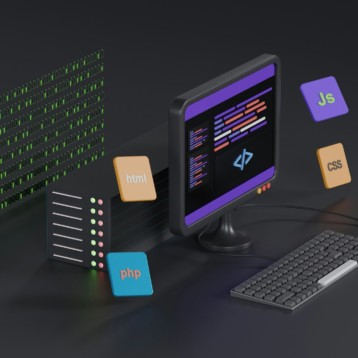In a complex world of programming languages, it is often hard to understand what you really need. In fact, it may lead to holy wars around the question which one is the best. In this article, we are going to address one of such burning arguments – PHP vs Node.js. Their comparison seems necessary, as they both act in the same field, mostly aimed at the web development. Moreover, they are both open source platforms and are often applied for the same web solutions. So, let us see the battle of Node.js vs PHP and define the winner!
PHP – Old But Gold
One of the most used programming languages, PHP was thought to be second to none since its launch in 1994. Its most successful manifestation is probably Content Management Systems, including WordPress, Drupal, Magento, and Joomla, that millions of websites are based on. It is estimated that more than 80% of the web servers use PHP. The language has various advantages providing its successful and efficient functioning as one of the leaders in the field. The latest version (7.2.4, released this March), possesses such of them:
- low learning curve. In the fast-changing modern world, it is important, as it means there is no need to train a person for a long time for him or her to start writing code;
- long-existing set of frameworks and packages for API. Thanks to its functioning on the market for almost quarter of a century, PHP has a perfect manual as well as twenty-four years’ history of FAQs. That means that a programmer using PHP will get enormous support from everyone who has faced a similar challenge before;
- great updates. With the release of PHP 7, the memory consumed by the platform has decreased several times, while the performance has increased;
- long-lasting history of the most successful sites. Today’s PHP configurations are based on its impressive history of building such websites as Wikipedia, Facebook, Vkontakte, Tumblr, MailChimp, etc.
However, there are always some flies in the ointment, and PHP is not an exception. Despite its successful history, many experts proclaim that it works badly with high-loaded projects. What is more, it sometimes requires extraneous packets. It is also limited in its capacities as its scope of application is restrained to web development.
At the dawn of its history, PHP coexisted peacefully with JavaScript, but with the start of Node.js the situation changed. Why is it so and what dangers can Node.js pose to the giant of web development?
Node.js – Hard Nut to Crack
The world of technologies doesn’t stand still. New and innovative solutions appear every day. Back in 2009, such a solution to many burning issues JavaScript faced was Node.js. Many people would say that in the battle of PHP vs Node.js the latter falls short of experience. However, one can see a steady market progress of Node.js and be sure that a Google V8 platform based on JavaScript modules will go a good way. It possesses a number of effective frameworks that may make the work with it much better than with any other tool. Its numerous advantages also include:
- asynchrony. Due to it, Node.js can handle a large number of requests simultaneously;
- modularization;
- configured web server. Because of it, no additional software is needed to run the code;
- a large scope of application: Node.js can operate both web and cross-platform applications;
- flexibility. The platform possesses few hard rules and strict guidelines. It gives the programmers room for creativity and freedom in their work on the applications;
- non-blocking functions. It is probably its best advantage in the battle of Node.js vs PHP.
For those reasons, Node.js is widely used for web development. Such services as Netflix, Uber, PayPal, LinkedIn, eBay and others are based on it. Moreover, Node.js is perfect for creating such applications for OS as Trello and Slack, which are now extremely popular due to development of Agile methodologies.
Of course, nothing is ideal, and we can blame Node.js for the absence of a wide frameworks choice, lack of business logic, and a strong need in the available CMS solutions. However, Node.js is still called to be a perfect solution for custom development, building API, working with chats and sockets.
PHP and Node.js Comparison
Now, when we know the thumbnails of what PHP and Node.js can be proud (or ashamed) of, let us try to compare them. We know that some experts say it isn’t quite correct, as they are different in their structure. However, we will pay more attention to the functions they perform.
Hello World
The first and foremost is, of course, getting started with “Hello World” part. In this regard, professionals usually admit the advantage of conceptually simpler, clearer, and more productive PHP code. It is also believed to be easier to use for developers with very basic knowledge of it. On the contrary, Node.js requires certain learning even from the mature JavaScript programmers.
Language Syntax
As we have mentioned, knowing JavaScript may be not enough for operating Node.js beautifully. However, this language is regarded more compressed and efficient than PHP. Despite the fact it is hard on its own, in this case one can use it for both client and server programming. That will simplify the work greatly.
Platform environment
Any programming language is nothing without a scope of platforms which are supported. In this regard, Node.js is much more productive, as PHP has very limited functionality above its basic server-side development technologies. On the contrary, one can now use Node.js almost everywhere – on the server, in the browsers, for desktop applications and embedded systems.
CPU Load and Performance
In this study, one can see that Node.js has progressed up to obscuring PHP’s fame, as in most cases JavaScript-based platform undertakes CPU under much less duress than it does. All in all, the performance of Node.js is generally better, as it is an event-driven platform, which is faster, has fewer hard dependencies, and non-blocking I/O solutions.
Conclusions
We can see that the battle of PHP vs Node.js the winner is rather hard to determine. Both languages are effective in their functionality. Moreover, we all know that the overall level of performance and speed of task completion is heavily dependant on the task itself. That is why you need to choose the language from the perspective of your task: if you need a long-term project support it’s better to deploy PHP. However, if you are aiming at the creation of the project with high traffic and a number of microtransactions included (such as chat rooms, likes, comments), it is worth paying attention to the Node.js. From what we can observe, it is gathering its steam on the market and promises us to become a serious competitor of the PHP. Good luck!











